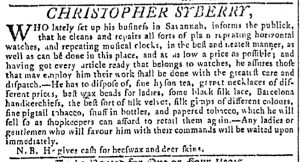What was advertised in a colonial American newspaper 250 years ago today?

“He will sell so as shopkeepers can afford to retail them again.”
When watchmaker Christopher Syberry announced to the public that he “lately set up his business” in Savannah in 1769, he also informed prospective customers that he simultaneously sold a variety of goods. His inventory included “fine hyson tea, garnet necklaces of different prices, best wax beads for ladies, some black silk lace, Barcelona handkerchiefs, the best sort of silk velvet, silk gimps of different colours, fine pigtail tobacco, snuff in bottles, and papered tobacco.” Selling these items provided an additional revenue stream in case Syberry could not drum up enough business to support himself cleaning and repairing clocks and watches.
Syberry made it clear that he did not merely retail the items listed in his advertisement; he also acted as a wholesaler who distributed goods to shopkeepers in the small port and throughout the rest of the colony. He did not emphasize price as much as many other advertisers during the period, but he did pledge to sell his wares “so as shopkeepers can afford to retail them again.” Although unstated, this may have included discounts for purchasing in volume. Syberry implicitly presented himself as an alternative to merchants in England who fulfilled orders by letter. Shopkeepers who opted to acquire goods from him gained the advantage of examining the merchandise in his shop and choosing those items they considered good prospects for retailing themselves. Syberry emphasized quality in his advertisement, repeatedly describing items as “fine” or “best,” but shopkeepers did not have to accept his assessment. They could examine those goods before buying them to retail. Those who visited Syberry’s shop saw and selected their wares rather than describing what they wished to order in a letter or instructing correspondents to send the latest fashions and then hoping for the best.
Other colonists who advertised similar goods in the Georgia Gazette operated as both merchants and shopkeepers, wholesalers and retailers, but Syberry distinguished his business by explicitly addressing shopkeepers and assuring them that he offered reasonable prices for his wares so they could “retail them again.” He may have anticipated that shopkeepers would make more substantial purchases than consumers, providing greater security for an entrepreneur who had “lately” launched a new enterprise in Savannah.
